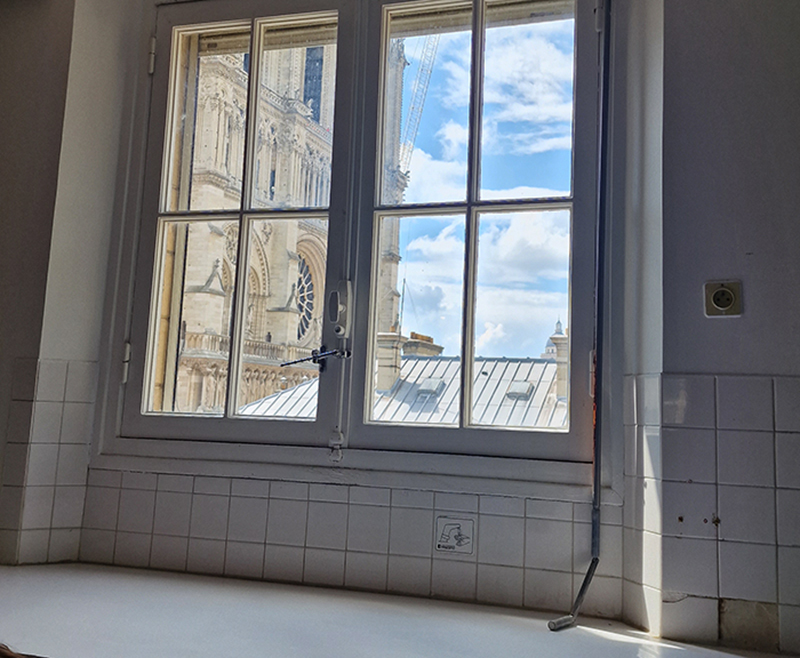Philosophy and digitalisation - a letter from Paris
"Travelling abroad is exciting and exhausting."
So begins the travel letter from Professor Gro Berntsen, currently a visiting researcher at CRESS in Paris.

I'm currently working in an epidemiological environment in Paris, at CRESS (Centre of Research in Epidemiology and StatisticS). This is the French Cochrane Centre, where they both crunch numbers and make them stand obediently in a row.
Here they have a separate unit that works exclusively with quantitative analyses to identify causal relationships. Here, methodological choices are scrutinised and discussed back and forth.
For me, it's very useful to have someone to discuss epidemiology and statistics with.
I've already learnt a lot!
Humanism in the centre of attention
Digi-health, as it is called here, is a central part of the research at CRESS. In this world there are ideals and grand visions.
"We must first decide what kind of healthcare system we want, then we must ensure that our new digital helpers are built for this vision," says the head of the centre, Professor Phillip Ravaud.
Here, people and humanism are at the centre. The idea of person-centred service is absolutely welcome here.
Philosophising about digital trends
The French love to discuss the philosophical basis for everything, and therefore also for the research we do.
Is artificial intelligence really intelligent programmes? "Intelligence is being able to apply what you already know to new problems and in new contexts. An algorithm is only as intelligent as the data and rules it has already been exposed to. In new areas, it still fails. So it's not true intelligence.
I've also gained insights into digital health trends that were new to me until recently. Have you heard of Just in time adaptive interventions (JITAI) or digital pills (which report to an app when you've swallowed them)?
CRESS is also working on finding "personomics" variables that say something about who we are, as humans, and thinks that this should be able to be incorporated together with genomics and proteomics in the large algorithms that will predict our future.
Madame the Professor must have an apartment
- "Titles are important here," they smile, and explain that I have to use the title of professor when I'm looking for accommodation.
- But isn't that perceived as terribly elitist, I ask.
- "Yes, but if you want good accommodation, you have to show off everything you have," say my colleagues.
Otherwise, there is little elitism to be found on the inside of CRESS. "Here, we all sit in multi-person offices. There is only one meeting room in the entire centre. You have to take video meetings at your desk, at the same time as the others who also have video meetings at their desks.

On the other hand, my workplace is perhaps the most exclusive place in the world: Hôtel-Dieu, right next to Nôtre Dame.
And I mean right by.
When we open the window of our five-person office, we can enjoy the street singers and the buzz of tourists from the square in front of Nôtre Dame.
Hôtel-Dieu is the world's oldest hospital still in operation, welcoming the sick and needy as far back as the 6th century.
There may not have been much in the way of modern medicine back then. The hospital was last modernised in the 1870s, and we are sitting in the "modern" version of Hôtel-Dieu.
Two-thirds of the building is closed off because it is being upgraded to modern standards. About time, a renovation-hungry Northerner would say.
Huge trees and impressive cathedrals
I was hoping for a warmer summer here than I usually get in the north. But this year the weather gods changed their minds and sent the tropical heat northwards. Here we've had rain almost every day, and it's been downright chilly. Nevertheless, we have cycled many discovery tours in and around Paris.
As a northerner, I'm particularly impressed by the fantastically large trees here. The forest is a completely different thing here. It's like entering a church when you walk along a forest path.
And the churches are a chapter in themselves. There are so many Gothic cathedrals here that they can't take care of them all. What prosperity they must have had to be able to afford to build so many churches and castles, and not just stay alive.
"We haven't started on all the museums yet. They'll come when the weather gets colder.
My French has made a quantum leap
The other day I understood almost half of what my colleagues were talking about at lunch.
But, alas, it's exhausting not being able to say what I want to say. Time and time again, I express myself imprecisely and clumsily.
Away is good, but home is best?
Suddenly I appreciate everything I haven't thought about in everyday Norwegian life: A short journey to work. Magnificent nature outside my living room window. And a language I've mastered.
It will be great to come home again in the spring.
